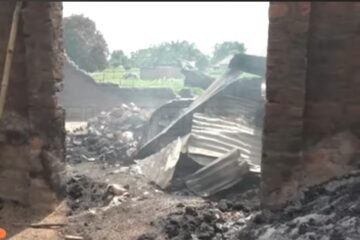Asked for comment, the South Korean government told the BBC in a statement that since establishing formal diplomatic relations in 1992, the two countries “have made together continuous efforts to develop their bilateral relations in a future-oriented manner on the basis of the shared view that they should put their unfortunate past behind them and move forward to the future”.
South Korea is now one of Vietnam’s largest investors, with economic giants like Samsung and LG Electronics pouring billions of dollars into building factories there.
South Korean journalist Koh Kyoung-tae, who first published researcher Ku Su-jeong’s controversial findings, says the idea that South Korean soldiers may have carried out atrocities doesn’t fit with the nation’s sense of itself as a victim.
Koh Kyoung-tae
“We Koreans say that we have 5,000 years of history and we’ve always been the victim. We’ve been colonised by Japan, Mongolia, China… and we endured it. It’s kind of like we’re proud of our victim mindset.”
South Korea also spent decades lobbying Japan for a similar apology over the hundreds of thousands of South Korean women forced to work as World War Two sex slaves.
Nguyen, who is deaf in one ear and seriously scarred all over her body as a result of her injuries, blames her own country for ignoring the issue. The Vietnamese government turned down two BBC requests to film for an accompanying documentary.
“Vietnam is afraid of anything that affects the relationship between the two countries so they don’t want to clarify it,” she says.
Back in Phu Hiep, Tran Thi Ngai, now 79, is also still wrestling with the fallout of the war.
She says her children have faced a lifetime of abuse and discrimination, mocked for being “lai dai han” (the Vietnamese term for the children of Vietnamese and Korean parents).
Her father was tortured and beaten to death under house arrest in 1977 as punishment for allowing his daughter to have relations with a South Korean. Tran herself was put in detention or prison three times between 1975 and 1978.
While it has not been possible to verify her specific case, the aftermath of the Vietnam War was an intense period of retribution, the country still riven with division.
“An apology might not be worth much, but it means a lot to us”
Vietnamese pressure group Justice for Lai Dai Han is simply pushing for an apology to the victims of rape by South Korean soldiers and those conceived as a result. There are estimated to be about 800 of the victims’ children still alive.
One prominent campaigner for the group is Tran Thi Ngai’s son, Tran Van Ty, who was beaten up regularly on his way to school for having a South Korean father.
Former UK Foreign Secretary Jack Straw, the international ambassador for the group, says there is no reason why an apology should adversely affect relations “if handled properly.
“Vietnam and South Korea have agreed, ‘Let’s go forward, let’s not look back,’ which I understand, but you’ve got to make exceptions to that sometimes.
“In some cases, in order to look forward you’ve got to settle things in the past.”
The group is pushing for an inquiry by the UN Human Rights Council.
Survivors of the massacres allegedly carried out by the South Korean military also filed a legal case against the South Korean government this month.
If the judge finds grounds to pursue it, the first hearing could be heard as early as this summer – though it is expected to take several years to reach a conclusion.
“An apology might not be worth much, but it means a lot to us,” says Nguyen Thi Thanh.
A bronze sculpture by British artist Rebecca Hawkins is meanwhile touring the UK, inspired by the story of Tran Thi Ngai and her son. “Mother and Child” shows two figures trapped by a strangler fig – a plant native to Vietnam which smothers the trees it wraps around.
“We need the South Koreans to acknowledge what happened,” Tran says. “They sent troops to Vietnam – it wasn’t us who went to their country.”





921727 290246really good post, i in fact adore this web internet site, maintain on it 966612
660088 19178Um, think about adding pictures or much more spacing to your weblog entries to break up their chunky look. 545647
956650 924768Some genuinely rattling function on behalf with the owner of this internet site , utterly wonderful content material material . 654574
144571 566365quite great publish, i in fact love this web site, carry on it 188051
207887 743158Precisely what I was seeking for, thankyou for putting up. 111050
173763 355615Do individuals nonetheless use these? Personally I love gadgets but I do prefer something a bit more up to date. Nonetheless, nicely written piece thanks. 456892
277757 339616This really is something I really have to try and do lots of analysis into, thanks for the post 323312
… [Trackback]
[…] There you will find 80269 additional Information on that Topic: famousreporters.com/1968-2/ […]
350112 747528Hey there! Nice stuff, please maintain me posted when you post something like this! 579824
… [Trackback]
[…] Read More Information here to that Topic: famousreporters.com/1968-2/ […]
… [Trackback]
[…] Read More here to that Topic: famousreporters.com/1968-2/ […]